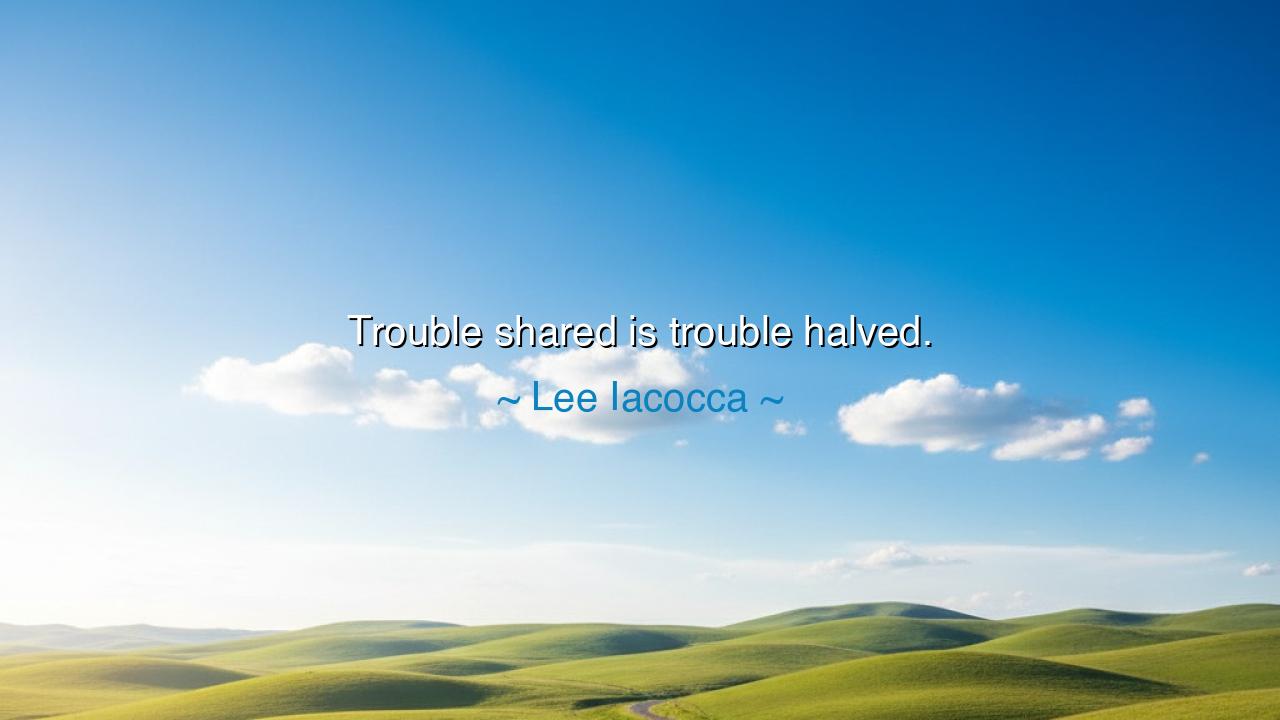
Trouble shared is trouble halved.






Burden becomes lighter when it is carried by more than one soul. When Lee Iacocca declared, “Trouble shared is trouble halved,” he revealed a truth as old as the human spirit: that in moments of struggle and suffering, we are not meant to stand alone. By sharing our pain with another—through words, through counsel, or through simple presence—we lessen its weight. Trouble, like a great stone, feels overwhelming when borne by one person, but when lifted together, it becomes a load that can be endured, and even overcome.
The essence of this teaching lies in the power of connection. Isolation magnifies sorrow. When we keep our troubles hidden, they grow darker and heavier within us, twisting the heart with fear and loneliness. But when we speak our worries aloud or seek the company of a trusted friend, the burden begins to dissolve. Even if the problem itself remains, the act of sharing transforms despair into hope, for it reminds us that we are not alone in our trials. Thus, in community, we find strength that no single soul could summon alone.
History provides many vivid examples of this truth. During the darkest days of World War II, when Britain stood alone against the advancing forces of tyranny, Winston Churchill called upon his people to unite. Through speeches and shared sacrifice, the nation became a single beating heart, each citizen carrying a fragment of the collective burden. Though their cities were bombed and their resources strained, their unity halved the weight of their suffering and gave them the strength to endure. Their survival was not the triumph of one man, but of millions standing together.
On a personal level, Lee Iacocca himself lived this principle during his leadership at Chrysler. When the company faced financial collapse, he did not try to solve the crisis in isolation. Instead, he shared the trouble openly—with workers, government officials, and the public—inviting them to join in the fight to save the company. By distributing responsibility and rallying others to the cause, he turned what seemed an insurmountable disaster into a historic comeback. This was not only a business victory, but a living example of his own words in action.
Yet, there is also a deeper spiritual truth here. To share another’s trouble is an act of compassion and love. When we listen to someone’s pain or offer a helping hand, we do more than solve a problem—we affirm their worth and humanity. In this way, sharing trouble becomes a form of healing, not only for the one who suffers but also for the one who gives. It is in these moments of mutual vulnerability that the bonds of friendship, family, and community are forged.
Let this teaching echo through the ages: no burden is meant to be carried alone. When darkness presses heavily upon you, speak and seek those who will stand beside you. And when you see another bowed beneath their load, offer your strength freely. For in the sacred act of sharing, troubles are halved, courage is doubled, and even the heaviest stone can be lifted by the hands of many.






GDGold D.dragon
This quote makes a lot of sense when you think about how we can find comfort in knowing others are there for us during hard times. But what about when we don’t have anyone to share our troubles with? How can we make sure we’re still able to cope when sharing isn’t an option? It’s a good reminder that connecting with others is valuable, but what happens when we’re left to face things alone?
QBle quang bao
I get what this quote is saying, but I wonder if it always holds true. Sometimes, sharing our problems with others can provide a sense of relief, but could it also create a sense of dependency? Does it ever lead to people feeling like they can't handle challenges on their own? Should we try to balance sharing with also developing our own coping mechanisms to deal with trouble?
GDGold D.dragon
This quote really resonates with me because it speaks to the power of community and connection. But it also got me thinking—can we rely too much on others to help us with our problems? Is there a point where we need to work through things on our own, rather than burdening others? I believe sharing does lighten the load, but at what point does it become unhealthy or excessive?
GKPham duc gia khanh
I really like this quote, and it makes me think about how important it is to have a support system when things get tough. Sharing your troubles with someone often does lighten the load. But I wonder—does this always work, or are there times when sharing actually makes things worse? What if the person you share with doesn’t understand or adds more stress? Does that make the trouble worse rather than halved?